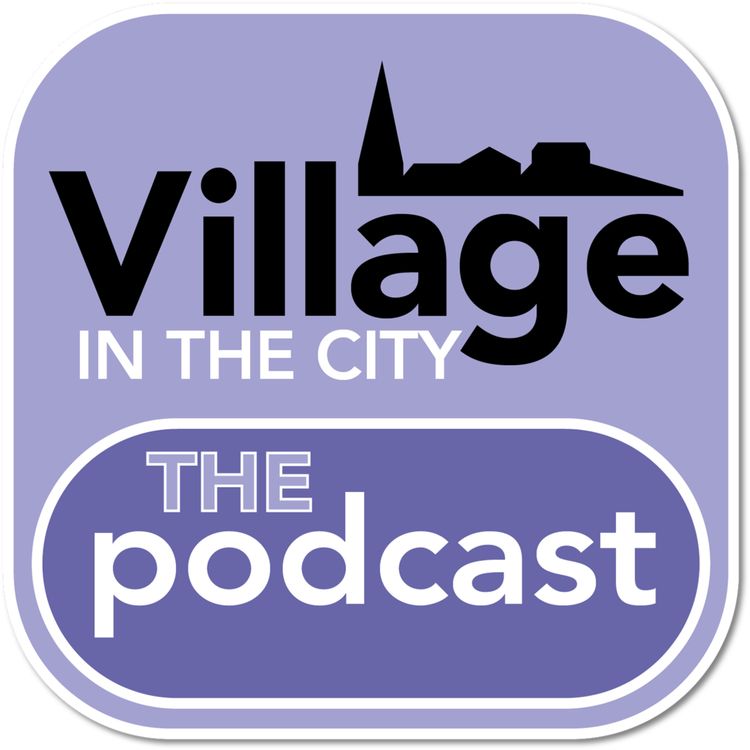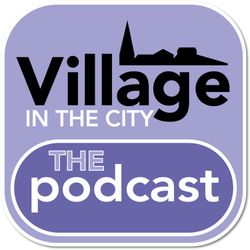Share

Village In The City
Episode 8: Building participation with Laura Puttkamer
Building participation in urban development and village-building is key... what are the keys to engaging with people?
Laura Puttkamer runs the ParCityPatory website and blog, where she is building ideas, stories and methods for making cities more participatory. Laura also hosts the Urbanism Book Club, an Instagram-based discussion group which tackles a new book about urban development every month.
Laura talks about ParCityPatory, some of the basics of building participation and engagement, answers questions and inspires us all to think about different ways to engage participation in our projects and village-building activities. Her slides have many useful links - download them here in pdf. There are also questions and reactions from around the world.
More about Village In The City (including many free resources and our online community) at http://villageinthecity.net.
More episodes
View all episodes

14. Episode 14: Intergenerational Work with Bella Kerr
37:14||Ep. 14In our latest Village In The City podcast recording Mark McKergow will be talking to Bella Kerr from the Generations Working Together. Bella is Intergenerational Development Officer She is a very enthusiastic proponent not only of getting generations working together but of making that work high-quality and mutually useful. We also hear from Bella's colleagues Diana Knox and Loreen Pardoe. This event took place during Global Intergenerational Week (24-30 April 2023) so it's a great chance to be tuning in to the possibilities offered by this kind of programme. Links discussed during the podcast: Generations Working Together https://generationsworkingtogether.orgBookbug https://www.scottishbooktrust.com/bookbugGlobal Intergenerational Week https://generationsworkingtogether.org/global-intergenerational-weekShort online training https://generationsworkingtogether.org/training/online-trainingPlay And Storytelling https://www.playscotland.org/resources/play-and-storytelling-connecting-generations-the-intergenerational-way/Summer Of Play https://www.summerofplay.co.uk/ Bella Kerr is Intergenerational Development Officer with Generations Working Together (GWT). She works with organisations across GWT Scottish Networks as well as globally connecting and facilitating intergenerational work to connect people, locally, nationally and globally. The work connects people from different generations, assisting and supporting them to form intentional intergenerational relationships. The work also looks at Ageism and Stereotypes (between young and older people), Research, keeping up to date with new ideas and Intergenerational Housing Places and Spaces, looking at and exploring the use of community space and how we can connect across generations to interact in our local communities. GWT is FREE to join for anyone living in Scotland and membership offers information and resources and training on intergenerational work and the difference that it can make when bringing young and older people together.
13. Strathcarron Hospice: Moving from 'community engagement' to 'community development'
40:16||Ep. 13We're talking to Susan High and Hannah Gray from Strathcarron Hospice near Falkirk in Scotland. Susan and Hannah have played a key role in moving the hospice from a 'community engagement' focus (a good thing in itself) to a 'community development' focus (even better). This work over the past 2-3 years has had eye-opening results and useful outcomes for their work both as clinicians and in the community. This journey is described in Cormac Russell's paper Understanding ground-up community development from a practice perspective published in the open access journal Lifestyle Medicine. It's free to download and very well worth a read! VITC founder Mark McKergow summarises the paper and points to come of the challenges to come in his blog here.On the call we talk about a 'three lane model' for community development. Lane 1: things the community can do for themselves, and the best way to support is to get out of the way. Lane 2: Things the community can do for themselves with a little help from outside. Lane 3: things the community needs outside help to do, and the best way to support is to keep focus on what the community wants, not what the experts think they 'should' want. Hannah also mentions the Denny Poppies project - find out more here. You can join Village In The City, access our free online community, get our handbook, blogs, resources and frameworks at http://villageinthecity.net.
12. Cormac Russell and The Connected Community
50:20||Ep. 12Join Mark McKergow and international ABCD guru Cormac Russell as they discuss Cormac's new book The Connected Community (with John McKnight). They discuss why connecting the community is so important, the critical role of discovering what's there already, and how to encourage neighbours to enhance their communities. Cormac reveals his 'tapestry weaving' metaphor for community development, which isn't in the book! We have questions from the USA, Ghana and Ireland about the role of local government, how to get involved in ABCD in an international setting, and thoughts on violence reduction (or is it?) with lessons from the USA and Scotland. Links mentioned during the call: Info and buy the book at https://theconnected.community/Wellspring Foundation’s work in Rwanda: https://www.nurturedevelopment.org/blog/rwanda-stories-community-action/ and https://thewellspringfoundation.org/stories/abcd/ Robert Sampson https://scholar.harvard.edu/sampson/publications/when-disaster-strikes-its-survival-sociable (re community safety)The Blueprint for Peace https://city.milwaukee.gov/414Life/About Lots more resources, podcasts, online connection for community builders and more at http://villageinthecity.net . About the book: Find out how to uncover the hidden talents, assets, and abilities in your neighborhood and bring them together to create a vibrant and joyful community. It takes a village! We may be living longer, but people are more socially isolated than ever before. As a result, we are hindered both mentally and physically, and many of us are looking for something concrete we can do to address problems like poverty, racism, and climate change. What if solutions could be found on your very doorstep or just two door knocks away? Cormac Russell is a veteran practitioner of asset-based community development (ABCD), which focuses on uncovering and leveraging the hidden resources, skills, and experience in our neighborhoods. He and John McKnight, the cooriginator of ABCD, show how anyone can discover this untapped potential and connect with his or her neighbors to create healthier, safer, greener, more prosperous, and welcoming communities. They offer a wealth of illustrative examples from around the world that will inspire you to explore your own community and discover its hidden treasures.
11. Jason Sears and VillageCo - building village-like communities in the NW USA
38:30||Ep. 11At Village In The City we're interested in building micro-local communities. Jason Sears, founder of VillageCo, has a slightly different yet related goal - building 'village-like' communities in large cities in the USA and then helping them become more local. Jason is using an open-source 'social gathering model' to do this, working in Seattle Washington and Boise Idaho. Jason talks to Mark about VillageCo, what they're doing, how it's working, this social gathering model and what Jason has learned so far. We touched on how Jason is using Open Space Technology as part of his gatherings, the Sunday Assembly 'non-religious church' and the importance of relationship building. Jason also offers his very top tip for local community builders around the world.
10. Last Aid: Supporting the dying in your local community
40:43||Ep. 10How can we act in a human way in that most difficult situation - when someone in our community is dying? The Last Aid project and course can help you. Mark talks to Susan Speke and Siobhan Neylon from Highland Hospice in Inverness who offer Last Aid training and support in the UK (https://highlandhospice.org/what-we-do/education-learning-development/last-aid). We discuss how dealing with death can and should be part of a community's response, why this is seen as such a difficult topic and how Last Aid's ideas and resources can help anyone become better and more comfortable about working with both the dying and those around them. Many people want to die at home, yet in western countries most die in institutions like hospitals and nursing homes. The Last Aid project helps to educate the community about the basics of palliative care and care for dying people. These courses are delivered using materials developed by Last Aid International. More than 10,000 people have already participated in Last Aid courses and more than 1,500 trainers have been trained across many European countries including Denmark, Switzerland, France, Germany, Slovenia, Lithuania, Ireland, Austria and Scotland, and around the world including Australia and Canada. Links: Highland Hospice Last Aid courses online and IRL: https://highlandhospice.org/what-we-do/education-learning-development/last-aid Last Aid project website information (in English and German): https://www.letztehilfe.info/project/#CommunityDevelopment #AssetBasedCommunityDevelopment #ABCD #VillageInTheCity
Episode 9: Safe strong cohesive communities with Dilia Swart, Protection Approaches
46:57|Dilia Swart talks about her work in building strong safe communities to protect people from identity-based violence in London and elsewhere.The latest Village In The City podcast welcomes Dilia Swart of Protection Approaches to talk about their work in building communities as a means of working to prevent identity-based violence. Protection Approaches was established as a UK charity in 2014 working to end all forms of identity-based violence motivated by the perpetrator's conceptualisation of their victim's identity, for example their race, gender, sexuality, religion or political affiliation. It encompasses hate crime, violent extremism, and genocide and affects individuals as well as entire groups or communities all around the world.A key part of this work is helping to build active, safe and strong communities where marginalised communities and voices are included. They work to broker new and sustainable community relationships that will facilitate community-led change in some of London’s most disadvantaged boroughs, and also run (very good) community development programmes supported by the Mayor of London and the Home Office. These programme aim to encouraging community-led responses to hate crime and the prejudice and marginalisation that can lead to such crimes.Dilia Swart is Senior Education Officer at Protection Approaches, and leads the delivery of their education programme working with schools to promote positive school cultures that foster tolerance and build resilience to divisive narratives. She was the co-founder of the Mostar Summer Youth Programme, an educational project in Bosnia-Herzegovina, and has degrees from Harvard and SOAS. Dilia and her colleagues share how the particularly tough issues of identity based violence can be tackled from a community perspective and share her experiences of working in London and elsewhere. The call was recorded in March 2021.
7. Episode 7: The Chatty Cafe Scheme
33:13||Ep. 7Loneliness is a problem facing many people around the world. Particularly in cities and urban contexts, it's so easy to be surrounded by people and yet feel unconnected and peripheral.This month on Village In The City our guest is Jenny Bimpson, one of the key organisers behind the Chatty Cafe Scheme. It's so simple - cafe and pub owners are invited to designate a 'Chatter & Natter' table where folk are invited to sit if they want to talk. From small beginnings in the UK the scheme has gone international! It is also running online chatty tables during the pandemic.We talk to Jenny about how it all started, their experience of getting people engaged, both as hosts and as natterers, and how it can help in the development of micro-local community and connection. Our members also contribute their own experiences of different ways to encourage people to talk to each other from around the world.LinksVillage In The City http://villageinthecity.net The Chatty Cafe Scheme http://thechattycafescheme.co.ukTransition Streets https://www.transitionstreets.org.uk/
6. Episode 6: Community Development and Rekindling Democracy with Cormac Russell
53:57||Ep. 6Cormac Russell is a passionate advocate for bottom-up community development, carried out BY citizens for their own communities. He is a long-term expert in Asset Based Community Development (ABCD), and says that finding and building 'what's strong' is vital in dealing with 'what's wrong'. Who gets to decide what the priorities are? What is the role of outside professionals and experts? And how can this make communities which are not only stronger but also more democratic and empowered?We are thrilled that Cormac has agreed to join us at Village In The City this month. He is a genuine international star, and his new book Rekindling Democracy has been making waves around the world. This promises to be an exceptional call, with Cormac's passion for asset-based action meeting Village In The City's Mark McKergow's three decades in Solution-Focused change and host leadership.Cormac speaks about the importance of bottom-up community building, relationships with institutions and professionals, and answers questions from participants. The call was recorded in December 2020.